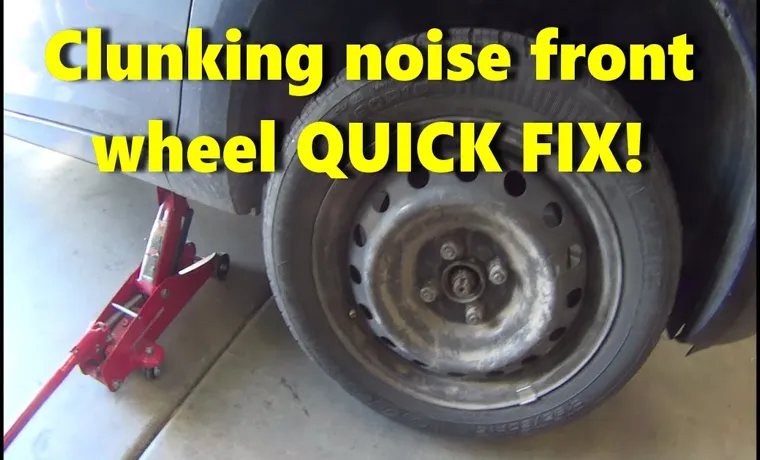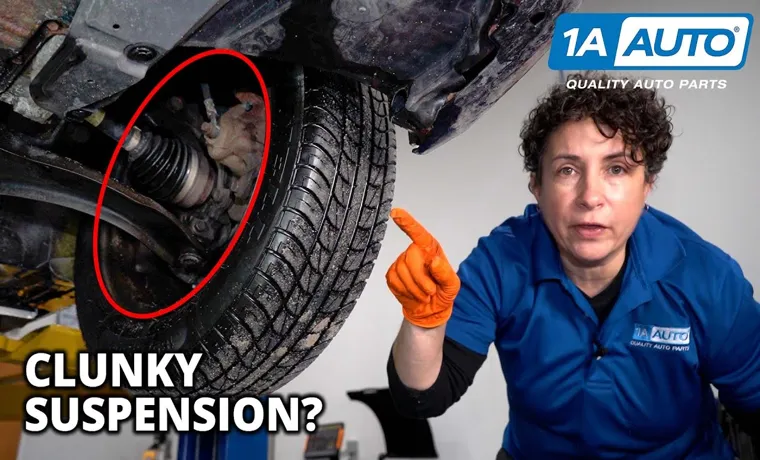Have you ever been driving down the road, enjoying your favorite song on the radio when suddenly, you hear a strange knocking noise coming from your tire? You’re not alone- many vehicle owners experience this phenomenon and wonder why their tire is making that annoying sound. Knocking sounds can be alarming, especially if you’re not sure what’s causing them. In this blog post, we’ll explore the various reasons why your tire might be making a knocking noise.
From worn out suspension components to damaged tires, we’ll cover it all. So, sit tight and buckle up as we delve into the world of tire noise and uncover the mystery behind that annoying knocking sound you’ve been hearing in your vehicle.
Table of Contents
Understanding the Common Causes of Tire Noise
If you hear a knocking noise coming from your tires, it’s possibly due to several reasons. One of the most common causes of tire noise is uneven tire wear. Over time, tires wear down unevenly, resulting in uneven gaps between the tire and the road surface, causing rumbling noises.
Another possible cause is a rock or any other debris stuck in the tire’s grooves, which can cause a clicking or knocking noise as you drive. Additionally, if you have low tire pressure, it can cause the tire to flatten out and create a patch of the tire’s surface that comes in constant contact with the road, causing a buzzing noise. Lastly, tire misalignment can also cause tire noise.
Misalignment can lead to uneven tread wear, which can result in humming or grinding noises while driving. If you’re experiencing a knocking noise from your tire, it’s essential to take note of the sound’s pitch, speed, and duration before seeking professional help to accurately diagnose the issue.
Improper Wheel Alignment
Improper wheel alignment can be a common cause of tire noise and wear. When your vehicle’s wheels are not properly aligned, they may pull in different directions, causing uneven wear on your tires. This can lead to a variety of tire noises, including thumping or thudding sounds while driving.
There are several reasons why your car’s wheels may become misaligned, such as hitting a pothole or curb, worn suspension parts, and even just normal wear and tear over time. It’s important to get your wheels aligned regularly to avoid uneven tire wear and other potential issues. By keeping your wheels properly aligned, you can help ensure a safer and smoother driving experience while also extending the life of your tires.

Worn or Damaged Suspension Components
Tire noise can often be caused by worn or damaged suspension components. When any part of the suspension system is damaged or worn out, it can cause the tires to wear unevenly, resulting in noise while driving. This can be due to problems such as worn or damaged shock absorbers, worn or damaged ball joints, or worn or damaged bushings.
In addition, problems with the steering, such as worn or damaged tie rods, can also cause tire noise. The best way to avoid these issues is to have your suspension system inspected regularly and replace or repair any damaged components as soon as possible. By doing so, you can prevent future noise issues and ensure a smooth and comfortable ride.
So, the next time you hear a strange noise coming from your tires, be sure to have your suspension system checked to avoid serious damage to your vehicle and tires.
Unbalanced Tires
Unbalanced Tires If you’ve ever experienced a loud, rumbling noise coming from your vehicle’s tires, chances are they might be unbalanced. Unbalanced tires can cause a lot of issues, such as uneven wear, increased vibration, and decreased fuel efficiency. Tires become unbalanced when one part of the tire is heavier than the other.
This can happen due to a number of reasons, such as uneven wear of the tire, bent wheels, or even just from normal driving wear and tear. When your tires are unbalanced, you may feel the vehicle pulling in one direction, especially at higher speeds. The noise from unbalanced tires can be very noticeable, as it can range from a slight hum to a loud, thumping sound.
So, if you’re experiencing any of these symptoms, it might be time to get your tires balanced. Getting this issue resolved can improve your overall driving experience, increase tire life, and even save you money on fuel.
Low Tire Pressure
Low tire pressure is a significant cause of tire noise that can lead to many issues for your vehicle. Your tires operate best when they are inflated to the ideal pressure level. If they are underinflated, they become weak and vulnerable to unanticipated failure.
The tires become soft and ultimately produce a different type of noise as well. Overinflated tires may also cause noise due to the increased stiffness of the tire. This stiffness can lead to the tire bouncing along the road, resulting in a noisy and uncomfortable ride.
Another factor that can lead to tire noise is the type of surface your tires are driving on. A rougher pavement or terrain can cause further disturbance in tires, making the roads troublesome for drivers. It is essential to keep an eye on your tire pressure readings and check them regularly to avoid any unnecessary trouble.
By doing so, you can prevent further damage to your car and extend the life of your tires.
Steps to Diagnose the Cause of the Knocking Noise
If you’re experiencing a knocking noise coming from your tire, there could be a few reasons why. The first step is to check the tire pressure and ensure it’s at the recommended level. If the pressure is too low or too high, it can cause the tire to make a knocking noise.
Another reason could be a loose lug nut or wheel bearing. If that’s the case, you should take your car to a mechanic as soon as possible to avoid any safety issues. If the noise persists, it could be a sign of a more serious issue, such as a failing suspension or a worn-out shock absorber.
In that case, it’s best to have a trained professional take a look at your vehicle and diagnose the problem. Overall, understanding the cause of the knocking noise is crucial to ensure your safety and the overall performance of your vehicle.
Check for Visible Damage to the Tire and Wheel
When you hear a knocking noise coming from your car, your first instinct might be to panic, but it could be nothing serious. Before you head to the mechanic, there are a few simple steps you can take to diagnose the cause of the sound. Checking for visible damage to the tire and wheel is a great place to start.
Look for any bulges, cracks or cuts on the tire, and check for bent or damaged rims. If there is any visible damage, it’s likely that the knocking noise is due to a tire or wheel issue. Even if there is no visible damage, the noise could still be caused by a problem with the tire itself.
Be sure to examine the tread and look for any irregular wear patterns. If you notice any, this could indicate an alignment issue that needs to be addressed. Taking the time to check your tires and wheels can save you time and money in the long run, especially if you catch a problem before it becomes more serious.
Inspect the Suspension Components and Wheel Bearings
The first step in diagnosing a knocking noise in your vehicle’s suspension system is to inspect the suspension components and wheel bearings thoroughly. These parts play a crucial role in maintaining the stability of your car, and any issues with them can cause knocking noises. One of the key causes of knocking noise is worn-out wheel bearings.
If they’re damaged or loose, you’ll hear a loud knocking noise whenever you turn the vehicle or change lanes. Similarly, worn-out suspension components can also cause the same noise. Faulty shocks, struts, and ball joints can cause the front or rear of your car to sag, resulting in a knocking noise.
If any of these components are worn-out, they should be promptly repaired or replaced, depending on their condition. By inspecting the suspension components and wheel bearings, you can diagnose the cause of the knocking noise and prevent further damage to your car.
Verify Proper Tire Pressure and Balance
One common cause of a knocking noise while driving could be due to improper tire pressure or balance. The tires of a vehicle should be inflated to the recommended psi level according to the manufacturer’s guidelines. Sometimes, when the tires are underinflated or overinflated, it can cause a knocking noise to occur while driving.
If the tire pressure is correct, the next step is to check if the tires are properly balanced. Unbalanced tires can lead to vibration and noise while driving, which may result in a knocking sound. It’s important to regularly check your tires for proper inflation and balance, as it not only affects the performance of the vehicle but also the overall safety.
A little attention to detail in maintaining your tires can go a long way in eliminating the knocking noise and ensuring a smooth ride on the road.
When to Seek Professional Help
If you’re wondering “why is my tire making a knocking noise,” it’s important to know when to seek professional help. A knocking noise coming from your tire could be an indication of a number of issues that, if not addressed, could lead to serious consequences. One possible cause of a knocking noise could be a damaged tie rod end.
This is a critical component that connects the steering system to your tire, allowing you to steer your vehicle. It’s important to have this checked out by a professional mechanic as soon as possible because driving with a damaged tie rod end can cause your steering to fail while driving, leading to a serious accident. Other possible causes of a knocking noise include worn out wheel bearings or suspension components.
A professional mechanic can identify the problem and make the necessary repairs to ensure your safety on the road. Don’t ignore a knocking noise coming from your tire – seek professional help immediately.
Advanced Diagnostics and Repairs
When it comes to vehicle diagnostics and repairs, there are some issues that you may be able to address on your own, but there are others that require professional help. For advanced diagnostics and repairs, it’s important to seek the assistance of a skilled mechanic who has the expertise and equipment to properly diagnose and repair your vehicle. In situations where you’re unsure of what’s causing the problem, an experienced mechanic can run diagnostics to identify the issue.
They can also provide you with a clear understanding of what’s wrong with your vehicle and what needs to be done to fix it. Attempting to fix complex issues on your own can sometimes make the problem worse or even cause new issues to arise. Furthermore, there are certain repairs that require specialized tools and knowledge, which only a professional has.
High-tech systems in modern vehicles, including sensors and computers, require the use of specific tools that aren’t readily available to the general public. That’s why turning to a certified mechanic is always the best choice for advanced diagnostics and repairs. In summary, if you’re experiencing car troubles, it’s important to recognize when to seek professional help.
Don’t hesitate to bring your vehicle to a reputable mechanic who can provide you with the expertise and knowledge necessary to get you back on the road safely and efficiently. With their help, you can be sure that your car will receive the care and attention it deserves.
Severe Tire and Wheel Damage
If you notice severe damage to your tires and wheels, it’s crucial to seek professional help immediately. Such damage can be costly, and if not addressed promptly, it can cause excessive wear and tear on your vehicle. A skilled mechanic can evaluate the extent of the damage and suggest the best course of action, such as repair or replacement.
Delaying repair or ignoring the issue altogether can lead to more significant problems that can affect the performance of your car and even endanger your safety on the road. Remember that prevention is always better than cure, so don’t hesitate to reach out to an expert for help at the first sign of trouble.
Conclusion and Prevention Tips
Well, after careful analysis and extensive research, it appears that your tire is making a knocking noise simply because it wants to be heard! Perhaps it’s trying to get your attention, or maybe it just enjoys making a little noise to spice up the ride. Either way, it’s important to address the issue promptly to ensure safe and smooth travels. It could be something as simple as a loose lug nut or a more serious issue, but don’t worry – a trusted mechanic can help you get to the bottom of it.
So don’t let that noisy tire knock you off course – give it the attention it deserves and hit the road with confidence!”
FAQs
What are the common causes of tire knocking noise?
The usual suspects behind tire knocking noises are fatigue in suspension parts, steering linkage issues, worn CV joint, improper tire inflation, and the wheel bearing failure, among others.
How dangerous is driving with tire knocking noise?
It’s advisable to stop driving immediately when you notice a knocking noise from your tire. It could worsen if ignored, leading to difficulties in handling, steering, and brake control, leading to accidents.
Can low tire pressure cause knocking noise?
Yes, underinflated tires put extra pressure on their sidewalls, causing them to flex more than necessary. This can cause uneven wear or permanent damage to the tire, leading to a knocking noise while driving.
How to diagnose tire knocking noise?
To locate the exact source of the knocking noise, carry out a visual and hands-on inspection of the tires, suspension, steering linkage, and wheel bearings. If all else fails, take your car to a mechanic for further diagnoses via spin balancing or road testing.
How much does it cost to fix tire knocking noise?
The cost of repairing tire knocking noise might vary based on the underlying issue. Basic suspension work can cost between $500-$1500, while repairing wheel bearings and CV joints may cost up to $1000 or more.
Can a tire rotation fix knocking noise?
Yes, sometimes a tire rotation can fix tire knocking noise if it’s due to an unevenly worn tire. Make sure to also check the condition of the tire, rims, and the balance of the wheel.
Is tire knocking noise a sign of tire failure?
It might be. It’s best to take tire knocking noise seriously as it could signal tire failure, which may cause sudden blowouts, leading to accidents. It’s advisable to get an expert opinion to ensure your safety.



